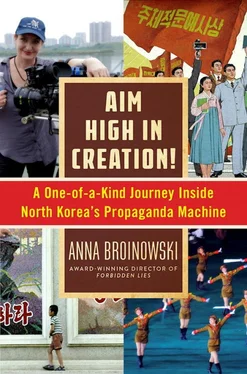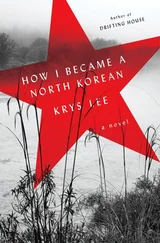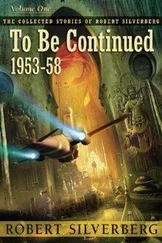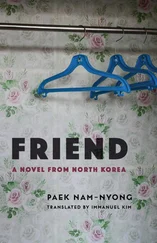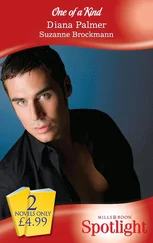Ms. K guides us into a shadowy vestibule zebraed by strips of daylight leaking from under the doors. We continue along a gradually shrinking corridor until we arrive at an old brown door. Ms. K knocks, the door swings open, and there, in a beautifully cut black suit, is the composer Mr. Pei. He ushers us in, delighted.
The room is hot and narrow, with a peeling linoleum floor. At one end, thick velvet curtains are wedged open for light. Ripped vinyl chairs line each wall. There is an old upright piano at one end and an analogue mixing desk at the other. All the chairs are empty, except for one: the Man in Black nods at us curtly, then stares blankly at the wall.
Mr. Pei tells us that ever since we met, he’s thought about nothing but writing a song for our film. All he needs are the lyrics and he can start. I nod confidently, realising I have absolutely no idea what the lyrics will be. I don’t even know who will sing them. All I know is that the song must not be one of Kim Jong Il’s aggressively happy peasant ditties. It must be melancholy and beautiful, and in a minor key. “Excellent,” says Pei. “That’s a good start. Send me the words later.” We all sit, and Pei inserts a four-track cassette into the mixing desk. The speakers crackle to life. Ms. K turns off the fans, and the music starts.
I am terrified, after last night’s movie marathon, that Pei’s music will be sentimental and cloying. But it’s extraordinary. Within two minutes in that hot room, I am somewhere wild and grand, a place of sweeping hills and jagged peaks—a land of people who think with their hearts and act with their souls—a surging, tempestuous place, full of passion and sorrow and joy. The track grows mournful, and a flute strokes our ears, soft as water. Then it swells again, pushing forward urgently, underscored by drums that beat like blood, and an insistent samisen, sharp and low.
I grin at Pei. I’m in love with this thing. It’s as cinematic as Ennio Morricone’s work, as powerful as a rock concert, as intense as love. I’m tapping my feet, but I want to march; I want to wave triumphant banners with the hordes of soldiers now singing jubilantly above the thundering drums. And then I have an awful thought: Pei’s mixing desk isn’t digital. This isn’t something he can copy onto a USB drive. I grab my camera and point the mic at the speakers, mortified that yet again I’m rolling without Ms. K’s permission. I’m sorry , I mouth at her. I need a copy ! She just gives me her half-happy, half-rueful smile and says nothing. Pei watches me ride the sound levels, thrilled. I guess no one has ever taken his music out to the West before.
The track builds to a shattering climax. “Pyongyang Nalpharam!” sings the choir, and I realise what we were missing out on when we fast-forwarded the North Korean Kill Bill. Kim Jong Il was right: a film without music is no film at all. I have a new respect for North Korean soundtracks. I must find a way to watch Pyongyang Nalpharam again, in real time, before I go. The track ends, and two more play: a cheesy ballad full of eighties synthesiser with a screeching soprano that could crack glass, and an elegant orchestral piece with an Asian chord structure played by classical Western strings.
The tape clicks off, and Lizzette and I clap loudly. We mean it. It was brilliant.
“Which one did you like?” Ms. K asks coolly.
I play along: “I like them all.”
Ms. K narrows her eyes and speaks more softly—something she does when things aren’t going according to plan. “You must choose one. They are by three different composers. Whoever you choose can work with you.”
I look at Pei, alarmed. I thought all the tracks were his. He looks straight ahead, stiff with pride. His high forehead is beaded with sweat. The Man in Black takes out his notepad and turns to me expectantly. It’s a test, and a cruel one. I have no choice but to be honest: “My favourite was number one.” Pei’s face crumples. I’ve seen Western composers react the same way when I cut a song or ask for a rewrite. Composing is the most emotional thing you can do. Rejection cuts to the bone.
“That composer is in the country,” says Ms. K simply. “But if you like him…”
“No, no,” I say quickly, hoping that by “country,” Ms. K doesn’t mean a gulag. “For our drama, I think something Korean but played by Western instruments, like violins, would be better. Something that blends our two worlds. Something like track three. I love that too.” I smile at Pei, praying that track three is his. If it isn’t, and he wrote the cheesy stuff in the middle, my Kim Jong Il–style film will be a parody, whether I like it or not. Pei dabs his forehead with a soggy tissue. His hands are trembling.
“Track three was written by People’s Artist Comrade Pei,” says Ms. K, and I can tell that she is pleased.
“Mr. Pei, please write us a song like that,” I say, and he flushes with joy. We lock eyes, and I speak in English, knowing that while he can’t understand my words, he understands me perfectly. I’m talking and humming, and he’s nodding and humming back, and somehow, we’re in perfect sync. Maybe it’s because we both play the violin. Or maybe it’s simply what Pak said, back at the banquet: filmmakers, no matter where they live, are family.
Ms. K hurries us back through the slogan-filled hedges for our ten a.m. with her boss, and my good mood evaporates. What if she was just going through the motions with Mr. Pei and has no intention of letting us back in? What if she’s leaving it to her boss to tell us our film is not going to happen? If they watched us heckling the DVDs from Floor Five last night, all bets are off. They’ll send us back to Beijing, and the short clips I’ve shot will be all I ever have of North Korea. Ms. K’s rigid smile hasn’t shifted all morning. She’d be brilliant at poker.
I follow Ms. K into the Yangakkdo’s revolving door, imagining playing Texas hold ’em with her back in Sydney—with my rowdiest friends and a bottle of bourbon. Maybe then her veneer would crack. She’d tell us what arseholes we were for slagging off the Dear Leader’s films. I’d tell her how mean she was to make me choose a song in front of Mr. Pei, and she’d joke that if I hadn’t chosen the right one, she’d have made me drink ten bowls of grey mullet soup. Then we’d get drunk, she’d clean up the pot with a royal flush, and we’d share stories from our lives, woman to woman.
It’s a fantasy, of course. Ms. K has drunk us under the table every night since we arrived, but her polite formality has never changed. She’s kept conversation to a minimum and observed every detail. I hate to think what she’s seen. “This way,” she says, leading us up to Floor Five along the same corridor I snuck down yesterday. Today, her shirt is a riot of frangipanis. I stare at their optimistic colours, hoping they are a sign—just like the North Koreans hoped Madeleine Albright’s earth brooch was a sign America wanted peace.
“Now Comrade Pei is writing a song, can I come back to film him play it?” I ask Ms. K, forgetting I’d sworn not to ask her anything. She ignores me and knocks on a door. A crew-cut man opens it, wearing a crumpled brown suit. He smells of alcohol. He ushers us into a tiny room dwarfed by an ostentatious mahogany table. Ms. K takes a seat beside him and a bird-like person in a waist-length orange muu-muu. Lizzette and I squeeze in to face them on high-backed chairs. The usual Kims look down from the wall. The drapes are closed.
“I hear from Comrade K you have enjoyed your time here,” says Ms. K’s boss, flashing us a friendly smile. There is no evidence of surveillance monitors in the room, or even the power points needed to run them. Just this tipsy man, his eccentric sidekick, and Ms. K—who pulls a leather folder from her briefcase. “Here is a tally of expenses for your stay,” she says, sliding some documents to Lizzette. Lizzette slides back an envelope fat with euros, and Ms. K’s boss shunts it to muu-muu. She rips it open and rapidly counts up the bills, licking her finger with little darts of her tongue.
Читать дальше
